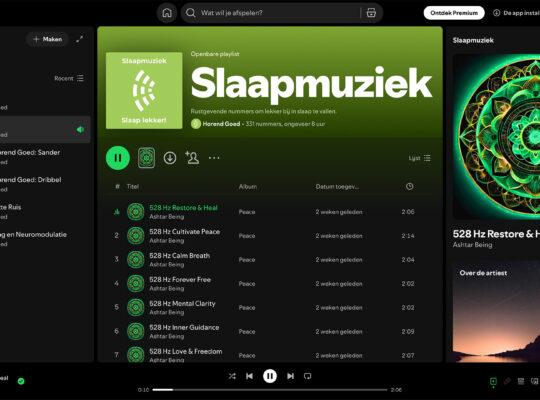Everyone is tired sometimes after a busy day filled with meetings, conversations or background noise. But for people with hearing loss, that fatigue is often structural. Not because they hear less well, but because they have to listen extra loudly all day long. And that takes energy – much more than you think.
In this blog, we dive into the link between hearing loss and fatigue. Why is listening so intense when your hearing is not optimal? What can you do to reduce that listening fatigue? And how can you take that into account as a loved one?
Listening is not passive
Let’s start with a misunderstanding: listening is not a passive activity. Your ears may catch sound, but it is your brain that has to make chocolate out of it. It filters, recognizes, interprets and supplements. It does this at lightning speed – as long as your hearing works properly.
With hearing loss, some of the sound falls out. That means your brain has to go up a notch to follow conversations. It starts guessing at what was said, uses context, pays attention to facial expressions and mouth movements, and tries to fill in gaps in the information. And that … is exhausting.
What exactly is listening fatigue?
Listening fatigue – also called listening fatigue – is a form of mental fatigue that occurs because listening to and processing sound requires extra effort. It is common in people with hearing loss, as well as those with tinnitus, hypersensitivity to sound or certain forms of autism.
Characteristic of listening fatigue:
- You feel exhausted after a day of talks, even if you haven’t done much physically.
- You have trouble concentrating or remembering information.
- You withdraw more quickly from social situations because it takes too much energy.
- You become more irritable or emotional faster than normal.
Why people with hearing loss tire faster
With hearing loss, listening is top notch. Here are a few reasons why:
1. The brain is constantly replenishing
If certain sounds or words don’t come through properly, your brain has to assess what was meant. They do this based on experience, sentence structure and the context of the conversation. Sometimes this works fine, but it requires constant focus. And just like a puzzle: eventually you just get tired of it.
2. Background noise makes it extra difficult
In a quiet room, following a conversation is still doable. But in a café, at a party or during a meeting with background noise? That’s when things get really tough. Your brain has to distinguish the “important” sound from the rustling scenery – something that hearing normally helps with automatically. With hearing loss, that filter doesn’t work as well, so it takes twice as much energy.
3. Visual information is indispensable
Many people with hearing loss compensate with visual cues: mouth image, facial expressions, body language. This helps, but also requires a lot of extra concentration. You are constantly scanning: who is talking? What is the face saying? Does it match what I think I heard?
4. Stress plays a role
Not being able to hear well can be stressful. You don’t want to miss anything, to not ask stupid questions, to not keep asking for repetition. This social tension is exhausting in itself, regardless of the listening itself. Some people even become socially avoidant as a result, precisely because it takes too much energy.
The impact on daily life
The combination of hearing loss and fatigue can have a major impact on daily life. Work, relationships, social contacts: everything comes under pressure. Someone with listening fatigue, for example, can:
- Having no energy left for dinner or phone calls after a work day.
- Retreating during a birthday or party.
- Having difficulty in meetings, especially when several people are talking interchangeably.
- Less likely to initiate conversations for fear of misunderstanding something.
This avoidance is sometimes wrongly interpreted as disinterest, introversion or even depression. While it is often purely about overstimulation and lack of energy.
What can you do to reduce listening fatigue?
Fortunately, there are ways to alleviate – or even prevent – listening fatigue.
1. Good hearing aids
Sounds like an open door, but it starts here: the better your hearing is supported, the less your brain has to assist. Hearing aids, hearing amplifiers or special listening devices (such as teleloops or microphones) can help tremendously. It is important that they are properly adjusted and worn in situations where they make the most difference.
2. Schedule moments of rest
Like physical exertion, intense listening requires recovery time. A short walk without conversation, a cup of tea in silence, or just closing your eyes for a while. Try to incorporate regular breaks – especially after busy conversations or meetings.
3. Minimize background noise
If possible, choose quiet environments. Turn off the TV or radio during conversations. Avoid noisy lunch spots. At group meetings, ask if someone can say something per turn. Small adjustments make a big difference.
4. Speak openly about your hearing loss
That may sound exciting, but it often relieves. When people know you hear less, they take notice more quickly. They talk more clearly, look at you, repeat something without judgment. That takes the pressure off to “pretend to understand everything” – and that saves energy.
5. Use support tools
In addition to hearing aids, there are other aids that can relieve listening fatigue: subtitles to videos, speech-to-text apps, solo microphones in a class or meeting. Soothing products such as ear muffs or sound filters can also help with overstimulation.
What can you do as a neighbor?
As a partner, friend, colleague or family member, you can mean a lot. Not by repeating or translating everything, but by offering empathy and peace of mind.
- Periodically ask if the conversation is easy to follow.
- Avoid multiple calls at once.
- Speak calmly, clearly, and look at someone.
- Respect it if someone wants to take a break.
- Don’t judge if someone cancels or is quiet – it could be pure fatigue.
A simple question like “Would you like to take a break?” or “Shall we find a quiet spot?” can make a huge difference.
Tired but not lazy
Last – but important – point: listening fatigue is real fatigue. It is not posturing, not laziness, not an excuse. It is a serious, mental strain that can take a heavy toll. By being understanding about it, you make it a lot easier for people with hearing loss to balance their energy and stay active.
Do you have hearing loss yourself or know someone struggling with it? Share this blog or use it as a starting point for a conversation. Because listening may take energy – but being understood gives energy back.








